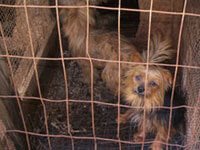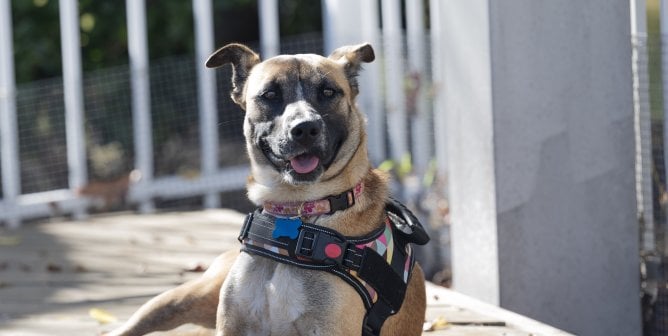Puppy Mill Prison
The pups in pet store displays are adorable—wriggling balls of energy just waiting to jump into customers’ arms. Store owners count on love at first sight because it prompts people to shell out hundreds, sometimes thousands, of dollars to take cute puppies home. It should be a happy ending: The dog gets out of a cage and into a home. But there is an unseen, darker side to the story.
As long as pet shops churn out puppies, homeless dogs in animal shelters will have to be euthanized for lack of a good home. Almost all pups sold in stores come from hellholes called “puppy mills,” where sad mother dogs and “studs” spend lonely lives in miserable cages, producing litter after litter, until they are no longer profitable.
A PETA investigator worked for months at Nielsen Farms, a puppy mill in Kansas. The investigator’s job was to feed, water, and clean up after hundreds of dogs condemned to cramped wire enclosures. The animals had no comforts—no bedding on the hard wire, little to no protection from the searing hot summers or the frigid winters, and no regular veterinary care, even when they were ill. Crusty, oozing eyes, raging ear infections, mange that turned their skin into a mass of red scabs, abscessed feet from the unforgiving wire floors—all were ignored or inadequately treated.
Here are some excerpts from the investigator’s notes:
- There are now five toy poodles in one of the wire cages. They are frantic when I come by to water or feed them. They paw at the wire door trying to get out. When I reach in to get their dishes, they scratch at my arms and make screaming noises.
- Melissa said that a while ago, she found an Australian shepherd in the barn that had been dead for days.
- The trough that collects the waste from the cages gives off an incredibly rotten smell, since it is merely rinsed with cold water and there is a large buildup of encrusted hair and feces.
- Amy grabbed the poodle’s leg to pull her out of a cage and yanked it really hard, causing it to break.
- There is a little terrier who jumps and hits his head on the top of his cage. He will yelp and scream while doing this over and over again. I can see the plastic roof of his cage bending from the impacts.
An Australian cattle dog with a palm-sized sore on her back was never seen by a veterinarian, and the wound did not heal properly. Some dogs who became caught in the wire of their cages injured their feet and hobbled around painfully, struggling to stay upright.
Our investigator also discovered that the collar on a Labrador retriever had not been adjusted as the dog grew and had become embedded in the dog’s flesh. Even though the gangrenous skin fell away as the collar was removed, the wound was treated with nothing but worm-repellent spray.
Timid dogs were terrorized by their more dominant cagemates, who often prevented them from eating and drinking. Conditions were also unsafe. Several Labrador pups escaped from their poorly built kennel, and one was killed by other dogs in an adjoining run. The fence was never fixed.
Perhaps most heartbreaking of all were the old mother dogs who had gone mad from confinement and loneliness. Our investigator watched these dogs circle frantically in their small cages and pace ceaselessly back and forth, which was their only way of coping with their despair.
The tragic conditions at Nielsen Farms are typical of the hundreds of puppy mills that litter the Midwestern states. Laws offer little protection and are poorly enforced by the U.S. Department of Agriculture (USDA), whose visits are infrequent and usually announced ahead of time. Our investigator witnessed one USDA inspection. The inspector glanced at the cages but did not examine the dogs. Later, the inspector asked for an employee’s home phone number, then called and asked her for a date.
Just weeks after PETA’s investigation of Nielsen Farms revealed tiny, filth-encrusted cages and sick dogs with raging ear infections, disfiguring mange, and open, untreated wounds, the Kansas puppy mill closed its doors, leaving one fewer dilapidated breeding farm to supply the pet store puppy trade. The U.S. Department of Agriculture also charged the farm’s owners with violations of the federal Animal Welfare Act.
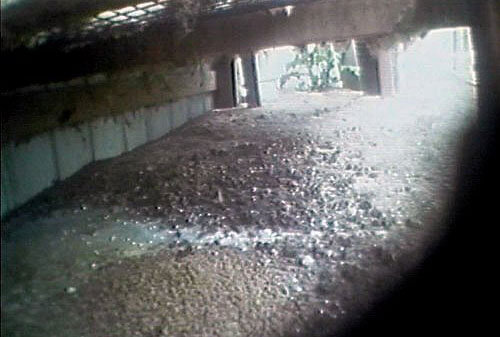
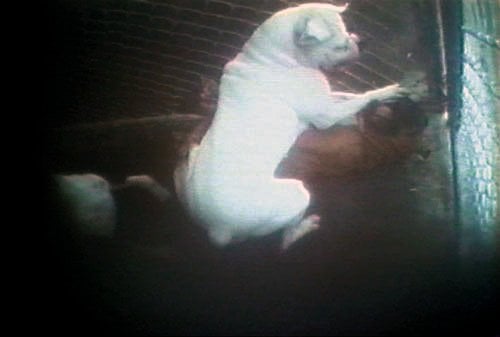

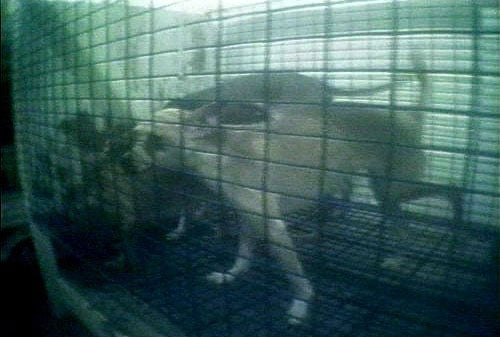
When film star Charlize Theron heard about PETA’s investigation, she quickly agreed to help tell the pet shop puppies’ story and narrate the investigation footage video. Charlize then sent a copy of the video to mall managers across the country, along with a letter urging them to dump pet shops.
Puppy mills such as Nielsen will continue to operate and profit as long as people buy puppies from pet stores. The public has the power to end the suffering of dogs in puppy mill prisons. You can help us reach consumers and make a huge difference for dogs who, like your own companions, deserve loving homes and happy lives.
You Can Help
Write or meet with rental agents who provide space to your local pet shops—including mall managers—and ask them to prohibit the sale of live animals in their rental properties. Instead of contributing to the overpopulation problem, pet shops can provide local shelters with a forum for adopting homeless animals, as is done at the Houston Galleria in Houston, Texas. (Click here for a sample letter to pet store managers.)
Monitor local pet stores that sell puppies. Many animals from puppy mills are sick or have serious congenital health problems. Immediately report sick animals to local humane and health authorities.
Write to the USDA and ask for a crackdown on all puppy mills. Had PETA not investigated Nielsen Farms, the USDA never would have brought charges. (Click here to see PETA’s letter to the USDA.)

